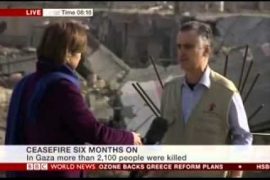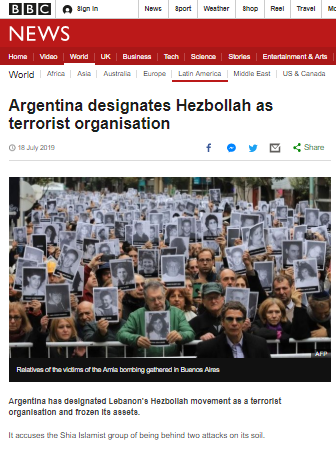For some years now we have been documenting the BBC’s ‘quote and promote’ editorial policy regarding NGOs. The overwhelming majority of the NGOs given a platform in the BBC’s coverage of Israel come from one side of the political spectrum and some of them are even involved in lawfare campaigns against Israel.
However, the BBC serially fails to meet its own editorial guidelines on impartiality which stipulate that the “particular viewpoint” of contributors should be clarified and audiences hence remain unaware of the fact that the information they are receiving is not only consistently unbalanced but often politically motivated.
Another example of unquestioning BBC amplification of politicised messaging put out by campaigning NGOs was seen in the November 5th edition of BBC One’s ‘The Andrew Marr Show’ during an interview (available here) with the Israeli prime minister.
In his introduction to the interview, Marr inaccurately presented the Balfour Declaration as a personal document from its signatory rather than one stating the position of the British government of the time. [emphasis in italics in the original, emphasis in bold added]
Marr: “Now in 1917 the British foreign secretary Arthur Balfour wrote a letter announcing his conversion to the idea that the Jewish people should have a national home in Israel. This Balfour Declaration is regarded as one of the founding documents of the modern State of Israel and to celebrate its centenary, Israel’s prime minister Benjamin Netanyahu has come to London where he’s been in talks with Theresa May. To some he is the arch-defender of the Jewish people. To others he’s a bellicose hardliner dedicated to expanding the very settlements seen by the Palestinian Arabs as their obstacle to peace and he joins me now. Welcome Prime Minister.”
Netanyahu: “The good part was shorter than the bad part.”
Marr: “Well let me turn to the bad part: the second bit of Balfour Declaration which does say that nothing shall be done which may prejudice the civil and religious rights of the existing non-Jewish communities in Palestine. Can you really say that that has been held to by your government?”
After Netanyahu explained that Israel’s Arab citizens do have civic and religious rights, Marr went on to present context-free allegation as fact:
Marr: “In Israel and in the occupied territories there are pretty gross human rights abuses. Human Rights Watch – let me read you this – ‘whether it’s a child imprisoned by a military court or shot unjustifiably or a house demolished for lack of an elusive permit or checkpoints where only settlers are allowed to pass, few Palestinians have escaped serious rights abuses during the 50 year occupation’. And again, Amnesty International say much the same thing – ‘Israeli forces unlawfully killed Palestinian civilians including children in both Israel and the occupied Palestinian territories and detained thousands of Palestinians who opposed Israel’s continuing military occupation, holding hundreds in administrative detention. Torture and other ill-treatment of detainees remained rife and committed with impunity’. That is not in the spirit of the Balfour Declaration.”
Leaving aside Marr’s attempt to promote the ridiculously contrived notion that part of the text of a statement produced by the British government a century ago is the litmus test for the policies and actions of modern-day Israel, as we see while presenting unquestioned allegations from two NGOs as ‘fact’, he completely failed to inform viewers of the political agenda that lies behind such tendentious claims from Human Rights Watch and Amnesty International.
Later on in the interview viewers saw additional examples of the failure to adhere to BBC’s professed editorial values of accuracy and impartiality when – referring to the district of Judea – Marr told his guest that “this is Palestinian territory”. When Netanyahu spoke of the extra-judicial execution of Palestinians in the Gaza Strip by Hamas, Marr interrupted with the jibe “you’ve shot a lot of people there too”.
The BBC’s long-standing policy of uncritical amplification of politically motivated allegations against Israel from agenda-driven NGOs such as HRW and AI clearly does not serve its declared purpose of providing “impartial news and information” aimed at enhancing audience understanding of the complex topic of the Palestinian-Israeli conflict.
Related Articles:
Promoted and quoted: the BBC’s preferred Middle East NGOs
Promoted and quoted: the BBC’s preferred NGO contributors in 2014
Promoted and quoted: the BBC’s preferred NGO contributors in 2015
Promoted and quoted: the BBC’s preferred NGO contributors in 2016
BBC bases rejection of complaint on word of anti-Israel NGOs




